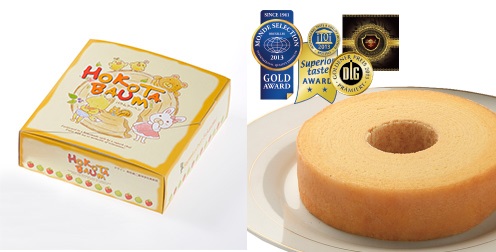In a dispute regarding distinctiveness of a word mark “HOKOTABAUM” in class 30 for goods “Baumkuchen”, a ringed, hollow cake that’s made on a spit with layer after painstaking layer of batter, a German traditional cake, the IP High Court upheld the decision of JPO negating distinctivenss of the mark and decided to refuse registration of the disputed mark (Heisei28 Gyo-ke 10109 ruled on October 12,22016).
“HOKOTA” nominally corresponds to a name of the city located in Ibaraki Prefecture, north east of Tokyo. JPO considered that the mark “HOKOTABAUM” is a term combining city name of “Hokota” with an abbreviation of “Baumkuchen” and refused the mark based on Article 3(1)(iii) of the Trademark Law since it consists solely of a mark indicating, in a common manner, the place of origin, place of sale for goods.
Plaintiff argued that relevant consumers and traders will not recognize Hokota City as a place where Baumkuchen is produced or distributed for sale because the City is not known for confectionery or cakes as local industry.

However, the Court dismissed the argument by citing decision of the Supreme Court pertinent to Article 3(1)(iii) of the Trademark Law.
The Supreme Court decision
Article 3(1)(iii) of the Trademark Law stipulates that any trademark may not be registered if the trademark consists solely of a mark indicating, in a common manner, in the case of goods, the place of origin, place of sale, quality, raw materials, efficacy, intended purpose, quantity, shape (including shape of packages), price, the method or time of production or use, or, in the case of services, the location of provision, quality, articles to be used in such provision, efficacy, intended purpose, quantity, modes, price or method or time of provision.
The article aims to exclude trademark registration on the grounds that exclusive use of such trademark by specific entity is inappropriately detrimental to the public interest and such trademark lacks inherent distinctiveness due to general use in business, thus is unable to serve its function as a source indicator.
Besides, in order to admit the trademark as a place of origin or place of sale for goods, it is not necessary the goods in dispute is actually produced or distributed for sale in the geographical place. As long as relevant consumer or traders generally perceive likelihood of production or distribution for sale of the disputed goods in the place, it suffices for requirement.
The IP High Court dismissed plaintiff’s argument in accordance with the Supreme Court ruling since the fact whether relevant consumers or traders recognize Hokota City as a place of production or distribution for goods of Baumkuchen is irrelevant in adapting Article 3(1)(iii).
In assessment of general perception test, the Court questioned what relevant consumers or traders perceive when they see the word mark “HOKOTABAUM” used on “Baumkuchen produced in Hokota City”, and concluded that relevant public is likely to conceive Hokota City from the term “HOKOTA” in disputed mark.
Plaintiff also alleged other examples of trademark registration having similar configuration to the disputed mark in order to demonstrate inappropriateness of JPO decision and bolster adequateness of his assertion. In this respect, the IP High Court judged that Article 3(1)(iii) should be assessed on a case-by-case basis at the time of decision to trademark application respectively by taking into consideration of attentiveness usually possessed by the user and a state of transaction of the goods.

Be the first to comment on "The IP High Court refused a word mark “HOKOTABAUM” due to lack of inherent distinctiveness"